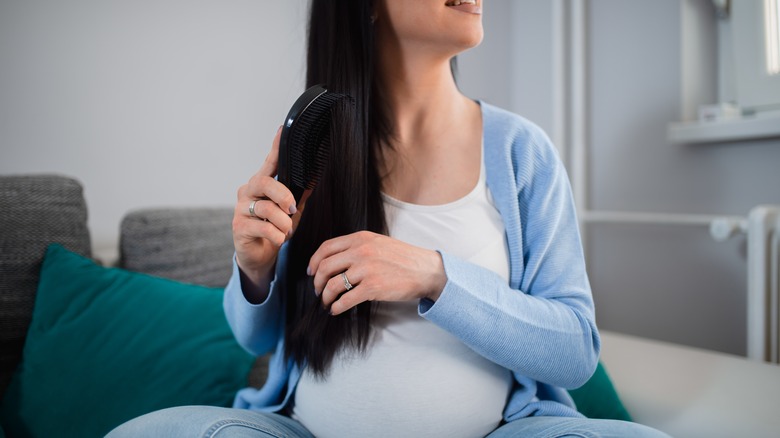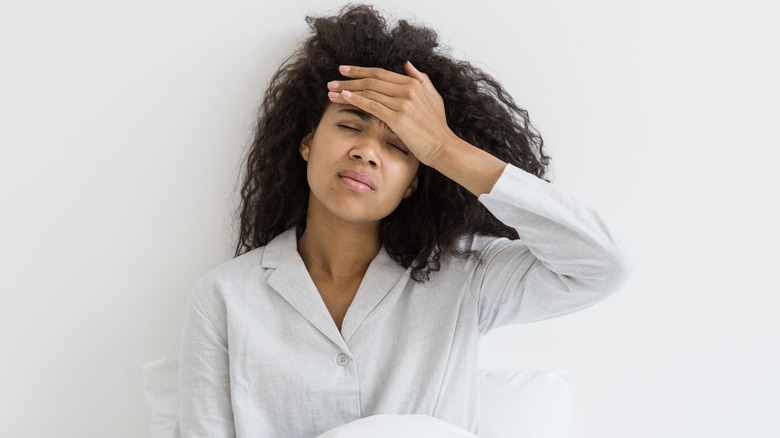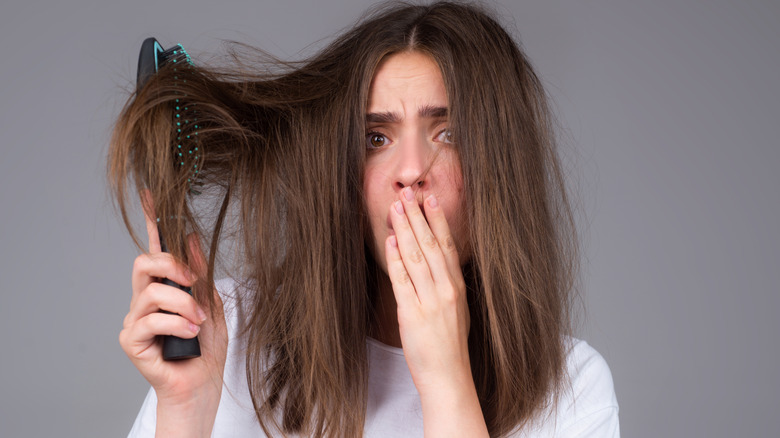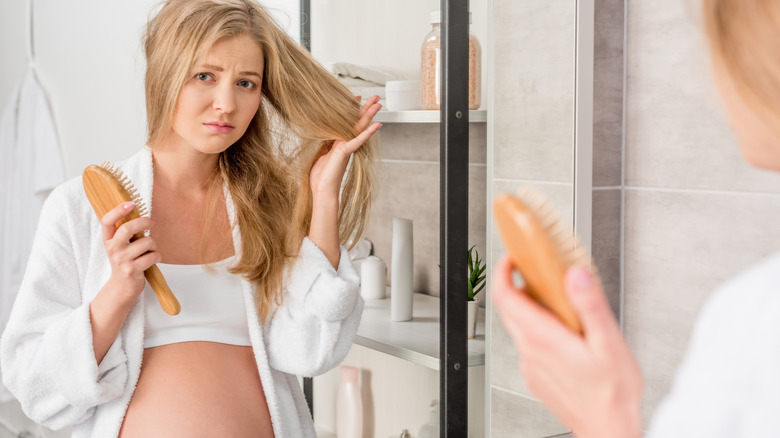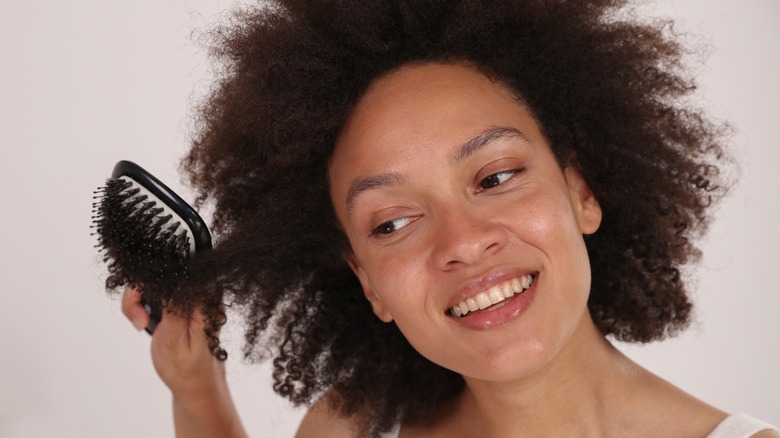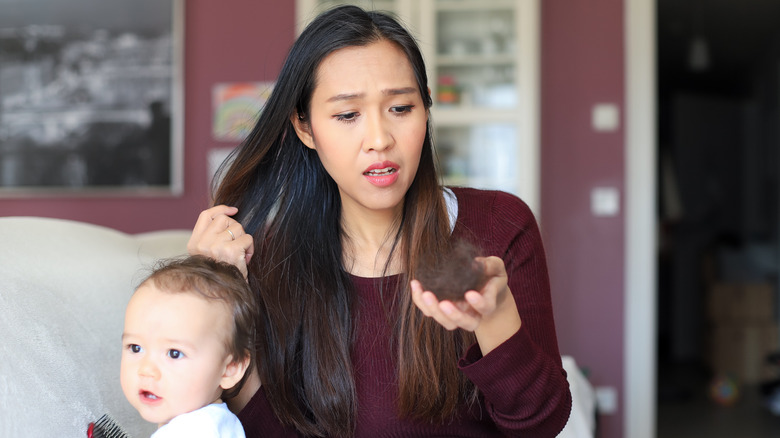Caring For Your Hair As It Changes During Pregnancy
It should be expected that something as astounding as creating a human being in your body would produce a lot of body changes. Pregnancy can produce a multitude of symptoms, and many can start even before you know you're pregnant. Common early pregnancy symptoms can mimic signs of premenstrual syndrome, or PMS, so they can be difficult to distinguish. These include tender breasts, fatigue, nausea, and frequent urination, as per Mayo Clinic. Eventually, you'll experience a missed or late period, which may be the first real clue that you are pregnant.
As pregnancy progresses, your body continues to change in a myriad of ways. While some things are obvious, like weight gain and backache, there are more subtle changes, like skin, mood, and even hair changes. The state of your hair typically results from what is going on in your body, and during pregnancy, hair requires special care.
Hair undergoes many changes during pregnancy
Hair changes during pregnancy are a very common occurrence. However, just as everyone will not experience the same pregnancy symptoms, people will also undergo different changes in their hair. One person might have intense food aversions and never vomit, while another may throw up every day. Still, another (lucky) person may never experience nausea at all.
Though everyone's experience is different, the underlying cause for nausea and vomiting, as well as changes to the hair, are caused by hormones. The main hormones that cause the most body changes are estrogen and progesterone, as per Healthline. Though estrogen is always present in the body and fluctuates during the monthly cycle, the influx of estrogen at the onset of pregnancy is swift and dramatic. In fact, you will have more estrogen when pregnant than you will have in your whole life combined when not pregnant.
Hair grows faster
The sharp increase in estrogen during pregnancy can affect hair dramatically. Hair follicles remain in their growth phase, also known as the anagen phase, for a much longer period," OB/GYN Dr. Monica Grover tells Verywell Health.
This can result in hair growing exponentially, which may delight many who enjoy the long luxurious lock when pregnant. You may notice that you need more frequent haircuts. Let your stylist know you're pregnant and ask them to look out for any changes and whether you should up your regular appointment schedule.
However, when hair grows in more, it grows in all places, not just on your head."All body hair [can be] affected due to the estrogen, as well as [an] increased blood flow to deliver hormones and nutrients," says Grover. "Hair may even grow in new areas." Consequently, you may notice hair on your face, chest, and stomach.
Your hair may become brittle or limp
Not only does hair grow faster during pregnancy, but it can undergo changes to its texture, which can cause you to change up your beauty routine a bit. While hair may look thick and voluminous, it can also appear limp for some. Koni Bennett, hair stylist, advises a foolproof technique to gain volume, "Washing at night, and allowing your fully-blown dried hair to rest in a high bun while you sleep can be the volumizing hair hack you never knew you needed" (via what to expect). You can also try blow-drying your hair upside down after using volumizing mousse to give it a quick boost.
Remember that hair can also be prone to breakage and dryness during pregnancy, so you may want to avoid heat if your hair is dry. Be sure to properly condition and moisturize the ends and towel or air dry your hair instead of using a blow dryer. You'll also want to be very careful when brushing it, and consider using a wide-tooth comb if you have curly, wavy, or tangled hair.
When your hair frizzes out
For some, hormones cause their hair to get incredibly frizzy. With certain natural textures, when hair gets dry, frizz follows. You'll want to ensure your hair stays well nourished while attending to the frizz. In addition to following all the advice for treating dry hair, adding a hot oil treatment to your regular beauty routine can help combat frizz while moisturizing the hair at the same time. A wide selection of hot oil treatments is on the market, but making one at home is easy. It can also lessen the number of chemicals introduced to your scalp.
Simply use olive or vegetable oil and gently work it into your ends and scalp to nourish the dry strands and the skin on your head, as per The Bump. To gain extra benefits, you can wrap your hair in a warm towel or shower cap for an extra touch.
Postpartum hair loss
There are so many things that happen to your body after giving birth. Just as the influx of hormones in early pregnancy can cause excessive hair growth, the swift decline in pregnancy hormones once the baby is born can result in losing hair. Many new moms notice large amounts of their hair coming out with every wash and sometimes even just falling out during the day.
Though it can be a bit startling, there is no need to fret because it's completely normal. It's a result of hormones going back to their pre-pregnancy levels, as per the American Academy of Dermatology Association. Often known as hair shedding, the hair will naturally regain its normal volume and growth pattern within the first year after giving birth. In the meantime, you can switch to using a volumizing shampoo to boost your hair. When it comes to conditioners, you'll want to steer clear of any that are formulated for extreme conditioning, which can be especially heavy and make thinning hair look flat. Instead, look for a light conditioner. Then avoid adding conditioner to the scalp area and save it for just the ends.
